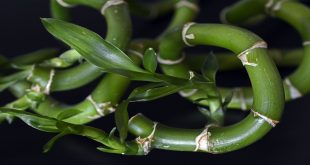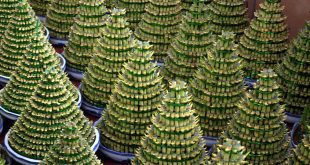If a dog eats lucky bamboo, it can lead to gastrointestinal issues and potentially be toxic. Lucky bamboo contains a chemical called saponin, which can cause vomiting, drooling, abdominal pain, and diarrhea in dogs.
In severe cases, it can lead to more serious complications. As a dog owner, it is essential to be aware of the potential dangers of lucky bamboo and ensure that it is kept out of your pet’s reach. If your dog consumes lucky bamboo and exhibits any concerning symptoms, it is crucial to consult a veterinarian immediately for proper guidance and treatment.
Can Dogs Eat Lucky Bamboo?
Dogs And Plants: A Risky Combination
Dogs are known for their curiosity, which often leads them to investigate their surroundings with their mouths. While exploring their environment can be entertaining for them, it can also pose risks, especially when it comes to plants. Lucky bamboo, a popular houseplant known for its vibrant green leaves and attractive appearance, is one such plant that can be hazardous if ingested by dogs.
Let’s delve into the potential dangers of dogs eating lucky bamboo.
Toxicity Of Lucky Bamboo For Dogs
Lucky bamboo, scientifically referred to as dracaena sanderiana, contains a compound called saponin. While this compound may not be harmful to humans, it can be toxic to dogs. Saponin can cause a range of issues for our canine companions, including gastrointestinal upset, drooling, vomiting, and diarrhea.
In severe cases, it can even lead to more serious complications like pancreatitis or liver damage. Therefore, pet owners should exercise caution and take immediate action if their dog ingests lucky bamboo.
Symptoms Of Ingestion
If you suspect that your dog has consumed lucky bamboo, it’s important to be aware of the common symptoms associated with it. Keep an eye out for the following signs:
- Drooling: Excessive saliva production is one of the initial indications that your dog may have ingested lucky bamboo.
- Vomiting: Dogs often vomit as their body’s way of getting rid of the toxic substance.
- Diarrhea: Abnormal loose stools can occur due to the plant’s toxicity.
- Loss of appetite: If your dog suddenly loses interest in eating, it may be a sign of gastrointestinal discomfort.
- Lethargy: Dogs may become more tired and less energetic due to the discomfort caused by the ingestion.
If you notice any of these symptoms or suspect that your dog has ingested lucky bamboo, it’s crucial to seek veterinary assistance immediately. Early intervention can help prevent further complications and ensure the well-being and safety of your furry friend.
Being aware of the potential risks associated with lucky bamboo ingestion can help pet owners take necessary precautions to create a safe environment for their dogs. Remember, prevention is key, so it’s best to keep lucky bamboo and other potentially harmful plants out of your pet’s reach.
What Happens If A Dog Eats Lucky Bamboo?
Digestive Issues And Upset Stomach
If your dog happens to munch on lucky bamboo, it is important to be aware of the potential consequences. Lucky bamboo contains a chemical compound called saponins, which can be toxic to dogs. When ingested, saponins can cause digestive issues and upset stomach.
Here are the key points to consider:
- The saponins in lucky bamboo can irritate the lining of the dog’s gastrointestinal tract, leading to stomach discomfort and digestive problems.
- Dogs may experience symptoms such as nausea, bloating, abdominal pain, and decreased appetite.
- The severity of the digestive issues can vary depending on the amount of lucky bamboo consumed and the size of the dog.
Vomiting And Diarrhea
Another common consequence of a dog ingesting lucky bamboo is vomiting and diarrhea. These symptoms are the body’s way of trying to eliminate the toxic substance. Here are the key points to be aware of:
- Lucky bamboo can act as a gastrointestinal irritant, leading to an increased likelihood of vomiting in dogs.
- Vomiting is a natural defense mechanism that helps expel potentially harmful substances from the stomach.
- In some cases, the ingestion of lucky bamboo can also cause diarrhea, which can be watery or contain blood.
Irritation And Inflammation In The Mouth
In addition to the digestive issues mentioned earlier, lucky bamboo can cause irritation and inflammation in the dog’s mouth. Here are the key points to keep in mind:
- When chewed or licked, the sharp edges of the lucky bamboo leaves or stalks can cause cuts or abrasions in the dog’s mouth.
- The saponins present in lucky bamboo can also lead to irritation and inflammation of the oral tissues.
- Symptoms may include drooling, pawing at the mouth, and reluctance to eat or drink.
To ensure your dog’s well-being, it is imperative to seek veterinary advice if your furry friend has consumed lucky bamboo. Remember to keep plants and other potentially toxic items out of your dog’s reach to prevent accidental ingestion.
Treatment Options For Dogs That Eat Lucky Bamboo
Lucky bamboo is a popular houseplant known for its attractive appearance and easy maintenance. However, if you’re a dog owner, you might be concerned about what could happen if your furry friend decides to munch on this decorative plant. While lucky bamboo is generally non-toxic to dogs, ingesting large quantities can still lead to digestive issues and potential blockages.
In this section, we will explore the treatment options for dogs that eat lucky bamboo, including immediate actions to take, inducing vomiting at home, and seeking veterinary help.
Immediate Actions To Take:
- Stay calm and assess the situation.
- Remove any remaining lucky bamboo from your dog’s reach.
- Check for any signs of distress or discomfort, such as vomiting, drooling, or abdominal pain.
- If your dog is experiencing severe symptoms or if you are unsure about the amount eaten, contact your veterinarian immediately.
Inducing Vomiting At Home:
- Inducing vomiting may be recommended if your dog has ingested a toxic substance or a large amount of lucky bamboo.
- Seek guidance from a veterinarian before attempting to induce vomiting at home to ensure it is appropriate for your specific situation.
- If instructed by a professional, you can administer hydrogen peroxide to your dog to induce vomiting.
- Follow the correct dosage as advised by your veterinarian and observe your dog closely during the process.
Seeking Veterinary Help:
- Whether you have induced vomiting or not, it is crucial to seek veterinary help after your dog consumes lucky bamboo.
- Take your dog to the veterinarian as soon as possible for a comprehensive examination.
- The vet will assess your dog’s condition, perform diagnostic tests if necessary, and develop an appropriate treatment plan.
- In some cases, your dog may require fluid therapy, anti-nausea medications, or other supportive care to ensure a full recovery.
Remember, prevention is always the best approach when it comes to your dog’s health. Keep lucky bamboo and other potentially hazardous plants out of your pet’s reach to avoid any unwanted incidents. If you suspect your dog has ingested any toxic substances, consult with a veterinarian promptly.
By taking swift action and seeking professional help, you can ensure the well-being of your furry friend when faced with such situations.
Frequently Asked Questions Of What Happens If A Dog Eats Lucky Bamboo:
Can Dogs Get Sick From Eating Lucky Bamboo?
Yes, dogs can get sick from eating lucky bamboo. It can cause gastrointestinal upset, including vomiting and diarrhea.
Is Lucky Bamboo Poisonous To Dogs?
Yes, lucky bamboo is toxic to dogs. It contains a compound called saponin, which can be harmful if ingested. It can cause symptoms like drooling, difficulty swallowing, and abdominal pain.
What Should I Do If My Dog Eats Lucky Bamboo?
If your dog eats lucky bamboo, it’s best to contact your veterinarian immediately. They can provide guidance on how to manage the situation and may advise bringing your dog in for an examination.
How Can I Prevent My Dog From Eating Lucky Bamboo?
To prevent your dog from eating lucky bamboo, place it in an area that is inaccessible to your pet. Consider using hanging planters or placing it on high shelves. Alternatively, you can opt for pet-safe plants if you have a curious dog.
What Other Plants Are Toxic To Dogs?
There are various plants that are toxic to dogs, including lilies, tulips, azaleas, and dieffenbachia. It’s important to research and be aware of the plants in your home or yard to ensure the safety of your furry friend.
Conclusion
Having a dog that eats lucky bamboo can be a cause for concern. Lucky bamboo may look harmless, but it can actually be toxic to dogs. If your furry friend accidentally ingests lucky bamboo, it’s important to act quickly. Call your veterinarian or a pet poison control center immediately for guidance.
They will be able to assess the situation and provide the necessary steps to ensure your dog’s safety. Remember, every situation is different, so it’s important to avoid self-diagnosis or self-treatment. Monitor your dog closely for any symptoms such as vomiting, diarrhea, or lethargy.
Preventing access to lucky bamboo is the best way to avoid potential ingestion hazards. Keep these plants out of your dog’s reach or opt for pet-safe alternatives. A safe environment is key to keeping your dog happy and healthy.
 GardenXpert Garden Advice Blog
GardenXpert Garden Advice Blog





